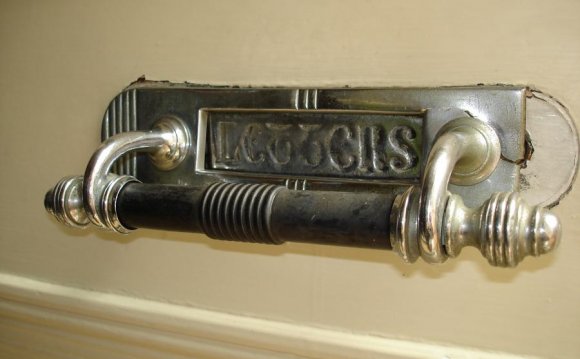
There’s some a fascist throughout folks. For some, the tragedy of human hope may trigger an impatient urge to expropriate and centralise when it comes to better usage of economic resources. Others, alarmed at the world’s exploding populace, might drawn by demands a programme of size compulsory sterilisation.
However for me personally it’s page containers and street numbering. I want order. I want persistence. I want standards. And I want eye-watering charges for property owners which try their particular fellow Britons’ determination and waste our time by simply making their details impossible to discover. I'm driven to distraction because of the merry chaos of Brit domestic and commercial details, and when I crick my back one more time stooping to try to force a flimsy report envelope through a vicious ankle-level steel trap of a letterbox, i will resign as a libertarian and howl for legislation.
Final week-end we moved leaflet-delivering for Lee Rowley, the Tory prospective parliamentary applicant for the winnable marginal East Midlands seat of North East Derbyshire. This capable and determined guy (he has got fought Dennis Skinner in Bolsover) needs all support they can discover if he could be getting his title around a large and geographically incoherent constituency. We often join him along with his staff on a Saturday early morning, leafleting towns and villages in which he has to be understood.
‘Mediating’ grassroots candidate-selection meetings we often ask would-be applicants: if you were lucky within the Commons ballot and won the chance to sponsor a personal Member’s Bill, just what wouldn't it be? After a lifetime of delivering and canvassing, i understand what mine will be. I'm Able To hear the Commons Clerk reading it today …
‘A Bill to ascertain a logical system of road numbering for domestic and commercial details; and for the application of compulsory common requirements for elevation, inner dimensions, weight of spring-loaded flaps and density of draft-excluders, of most letter containers made for basic usage; for better quality inside siting of these page bins; for simple accessibility and between these types of page bins; as well as for associated reasons.’
When you yourself haven’t delivered post to huge number of details with which you’re unfamiliar, it's possible to have no clue associated with the obstacles. Initially you have to discover the home whoever address seems in the uppermost envelope in a collection of about 50 within hand. It’s coming on to rain. Many addresses mention no street quantity, but just a home name — like ‘Four Winds’ or (that one spoke even more eloquently for me final Saturday compared to householder may have intended) ‘Wit’s End’. House-name-only envelopes are distributed arbitrarily among street-numbered envelopes, there becoming no simple system for buying all of them.
But universal numbering would be only the start. Many roads have odd numbers on a single side and evens on the other side — although not all. It’s common for number having dropped off the home or gatepost, or never been there to begin with, which means you need certainly to guess, assuming that the home after quantity 25 is quantity 27: but don’t count on it. It may be 25A. More, time and chance demolish entire rows of numbered homes, so you may leap from (proclaim) 15B to 73. Obstructs of flats generally — not always — share one street quantity, but less often display it. Some, however, carry on the street numbering from flat to level, to ensure that (say) one block of 20 flats will consist of figures 31-50, principal Street.
In Derbyshire, numerous roads and ways seem to have small lanes, intakes, alleys or passages simply from the primary road but which carry on the house-numbering as if these were about it. Which road a home on a large part attaches its quantity to is entirely random. Some homes face on to a road, but number by themselves along another road behind them.
My Bill will end all that. It will provide for the session of a nationwide commissar with powers to overrule local authorities and require householders to comply with a universal system. The Postal Access Czar would oversee a regional network of officers, but powers to know appeals against their particular rulings. But there would be no charm from the Czar’s decision. If necessary, we might must derogate from the Human Rights Convention to carry in my Bill.
All details in Britain is at the mercy of a rolling programme of review. Officers might have sweeping powers to require — on pain of fine or imprisonment — why these rationalised home numbers be prominently but tastefully visible through the road in standard typeface (no Gothic) readable from pavement; and that house brands be relegated towards status of whimsy.
Finally, minimal standards of access would be needed, with adequate signposting to point whether mail is to be published through doorways or into plainly marked free-standing mailboxes. If two adjacent houses have parallel paths to their particular particular forward doorways, a shortcut in one door to the other must certanly be provided, to truly save shoe-leather.
Permissible page containers would-be a minimum three legs above surface, flap-springs mild, the aperture at the very least eight ins wide, and the draft-excluder made of bristle soft enough to allow an envelope containing a two-sheet traditional survey (A4 folded into three) go freely through.
My Bill would result in the most enormous line, as did early tries to standardise enough time of time across The united kingdomt. There would be furious statements concerning the liberties of freeborn Englishmen, etc; Charles Moore would probably make an effort to get himself imprisoned for non-compliance; but after Royal Assent, and once the clamour had died away, resistance would crumble.
See also:- как работаект КарПрайс









